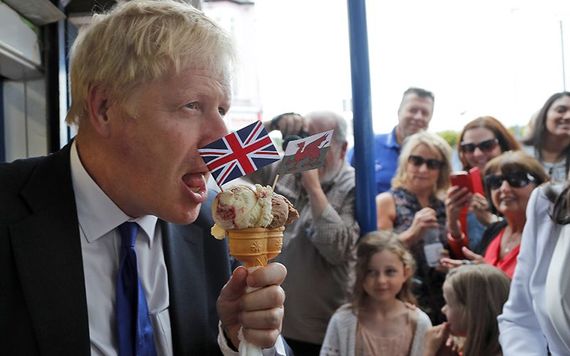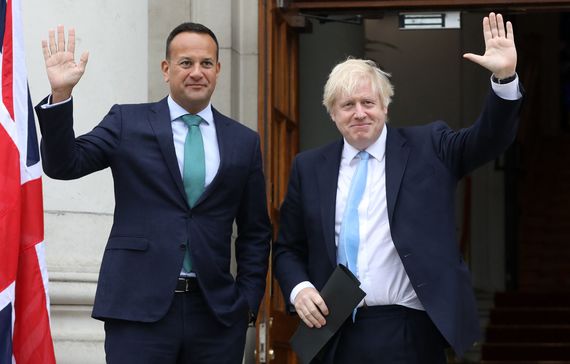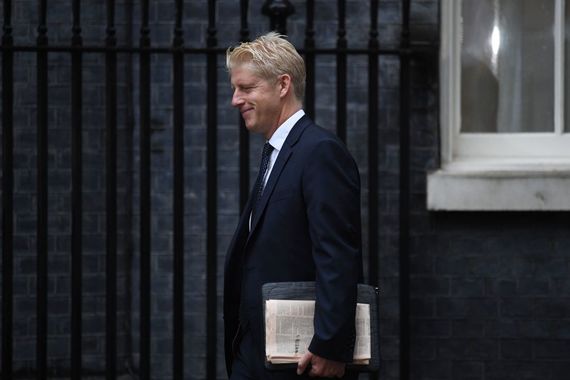In Europe this week the public confusion about Brexit is, if anything, even more pronounced now than in the USA. Quite simply, English credibility is shot to pieces.
No one here believes a word the floundering new British prime minister Boris Johnson says.
Just seven weeks into his job Johnson has already alienated half his own party and the prospect of getting Brexit done by October 31 now seems like a pipe dream.

From the moment he seized power he suffered a series of historic and humiliating political defeats, in the process making more undeliverable promises to the hardline Democratic Unionist Party and the so-called Brexiteer Party, both of whom expect him to leave the EU soon without a deal and over Parliament's strong objections.
Read more: Time’s up - getting serious about Ireland’s post-Brexit border
But Johnson, like Brexit itself, now seems trapped in an inescapable maze. Any Brexit deal must be ratified by Parliament but he doesn't have a parliamentary majority, and he's sacked 21 of his own Members of Parliament.
On top of that, as the Irish Taoiseach Leo Varadkar said last week, exiting the EU will be a Herculean task for the UK, contradicting Johnson's sunny claims that a clean break is imminent or even possible by the October deadline.
Exiting the European Union legally isn't the same as exiting it economically of course, as the increasingly anxious business community in the North has become painfully aware.

Tens of thousands of jobs and livelihoods are riding on those close economic ties and Johnson's government have shown no signs they are any closer to a political breakthrough than they have been over the past three years. The clock is running out and he looks content to let it, stranding thousands.
Varadkar's pointed jab that he wants the Irish government to act like Johnson's mythical Athena highlights the general consensus in Ireland that Britain has simply taken leave of its senses in a jingoistic flag-waving exercise that has everything to do with the lost status of a lost empire and nothing at all to do with its political or economic future, as an increasingly isolated player on the edge of Europe.
Read more: Brexit Boris needs to make major Irish choices ahead of deadline
Words like omnishambles, total chaos, utter disorder, and political self-destruction have been thrown around to convey the current crisis there, but it's on the European streets that you really see the fallout.
British tourists are being plagued for their opinions at hotel check in's, in coffee shops and restaurants, even in the lines for art museums. What has happened to your leaders, they are asked? Did you vote for all this madness, locals want to know? When and were will it all end?

If the intention was to forge an independent state and indicate their unique might in Europe, what has actually happened is that the mask has slipped on their class-based political system and their uniqueness is mostly found is appalling images of political crisis and chaos.
Prorogation, the purges of moderate players, then lying to the Queen and a Parliament that is mostly loathe to do the thing the Brexit public vote mandated and actually leave the EU have all led to the current paralysis.
But who, ultimately, is all this for, some critics have asked? Who will be the winners and the losers if it all goes ahead? One answer was found in the languid pose of Jacob Reese-Mogg, the upper crust MP who stretched luxuriously across a front bench as the British parliament around him tore strips off each other.

Reese Mogg's languor broadcast his own insuperable complacency and helpfully reminded critics just of how above it all Britain's top-hatted Eton and Oxford ruling class actually still are. They will walk between all raindrops ahead, buoyed by their own personal fortunes, but for the middle and working classes, it will be another story entirely.
The rich have the luxury of not knowing what they want, but not the nation. Whilst parliament is as divided as the people its richest members are running out the clock and surfing all the political and economic tides because it's all the one to them.

Johnson's younger brother had enough of the dumb show recently, announcing his immediate resignation from parliament and saying that he was “torn between family loyalty and the national interest.”
He had decided to fall on his own sword rather than help lead the nation toward untold disaster. The Prime minister looked on without saying a word.
His course is already set.
Read more: Confused by Brexit? Here's everything you need to know




Comments